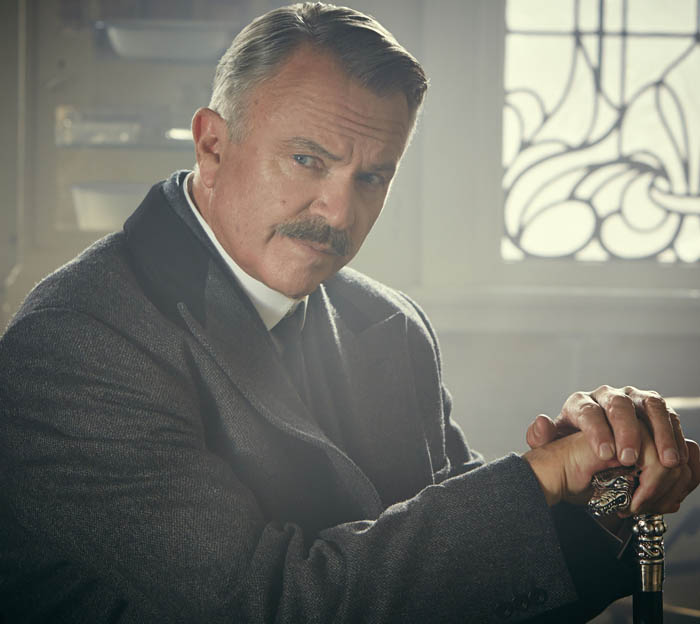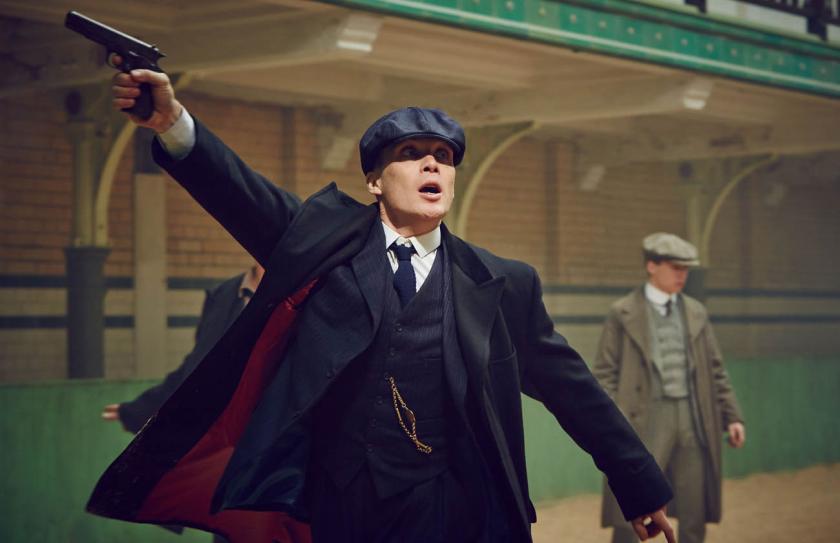So we're off for another blast of between-the-wars ultraviolence with the Shelby gang from Birmingham, once again soundtracked by incongruous electric blues music. Time has moved on from the immediate aftermath of Great War hostilities and now we're into the Twenties, which are roaring as if they're in agony. The baleful Tommy Shelby (a curiously shaved and bleached-looking Cillian Murphy) is aiming to undertake "business expansion" by extending the Peaky Blinders' racketeering tentacles down to London.
However, not everyone thinks this is a great idea. Younger brother John points out that the Shelby Company has been earning a handsome £150 a day from its Brummie-based operations, while Tommy himself admits that "in these times of 'unger and 'ardship, business is surprisingly good." But Tommy has grasped that if you're not on the way up you're on the way down, and there'll always be another outfit trying to steal your business.
 One prime motivation for moving the Blinders down to the Smoke, apart from getting away from the almost comical industrial murk and satanic furnaces of Birmingham, is to introduce Tom Hardy as Camden Town's Jewish crime boss Alfie Solomons, but writer Steven Knight teased us by keeping Hardy's arrival back until episode two. Nonetheless our appetite for the lurid and lawless metropolis was whetted when Tommy and brothers John and Arthur paid a visit to a London nightclub (wherein the goings-on suggested an X-rated trailer for Sodom and Gomorrah) controlled by the Sabini gang. This didn't go well, since the Peakies were ordered to leave because they'd "crossed the line". After a short, intense bout of smashing the opposition in the face with bottles, the boys were forced to beat an orderly retreat.
One prime motivation for moving the Blinders down to the Smoke, apart from getting away from the almost comical industrial murk and satanic furnaces of Birmingham, is to introduce Tom Hardy as Camden Town's Jewish crime boss Alfie Solomons, but writer Steven Knight teased us by keeping Hardy's arrival back until episode two. Nonetheless our appetite for the lurid and lawless metropolis was whetted when Tommy and brothers John and Arthur paid a visit to a London nightclub (wherein the goings-on suggested an X-rated trailer for Sodom and Gomorrah) controlled by the Sabini gang. This didn't go well, since the Peakies were ordered to leave because they'd "crossed the line". After a short, intense bout of smashing the opposition in the face with bottles, the boys were forced to beat an orderly retreat.
It won't end there, though. For all his glacial cool, Tommy is being ruthlessly manipulated by Major Campbell (Sam Neill, pictured above), who glides through the shadowy margins of the action like a spectral assassin. Now attached to the government's Irish Office and answering to Winston Churchill, Campbell plans to use Tommy as an expendable assassin, and will be quite happy to put his head in the hangman's noose once he's served his purpose. Churchill (Richard McCabe) is presented as a bloodless power-broker, painting a portrait of the naked woman lounging in his office during his lunch hour while shuttling the chess-pieces of state with consummate emotional detachment (Helen McCrory as Aunt Polly, pictured below).
 Peaky Blinders is grimy, intense and quite watchable, but sorely lacks characters you can feel any warmth towards. Everybody's existence is so closely geared to survival and fighting off an array of fantastically brutal opponents (assorted Irish gangs, the Sabini mob, Campbell's bunch etc) that the web of extended family relationships doesn't get enough narrative oxygen to flourish. This is where any comparisons to (for instance) Boardwalk Empire fall apart, because the American show has had the scope and budget to develop a range of independent, well-differentiated characters within an intricately drawn world. Peaky Blinders is like a whirlwind tour of hell, where you can hardly find your bearings amid the welter of shootings, beatings and threats.
Peaky Blinders is grimy, intense and quite watchable, but sorely lacks characters you can feel any warmth towards. Everybody's existence is so closely geared to survival and fighting off an array of fantastically brutal opponents (assorted Irish gangs, the Sabini mob, Campbell's bunch etc) that the web of extended family relationships doesn't get enough narrative oxygen to flourish. This is where any comparisons to (for instance) Boardwalk Empire fall apart, because the American show has had the scope and budget to develop a range of independent, well-differentiated characters within an intricately drawn world. Peaky Blinders is like a whirlwind tour of hell, where you can hardly find your bearings amid the welter of shootings, beatings and threats.















Add comment